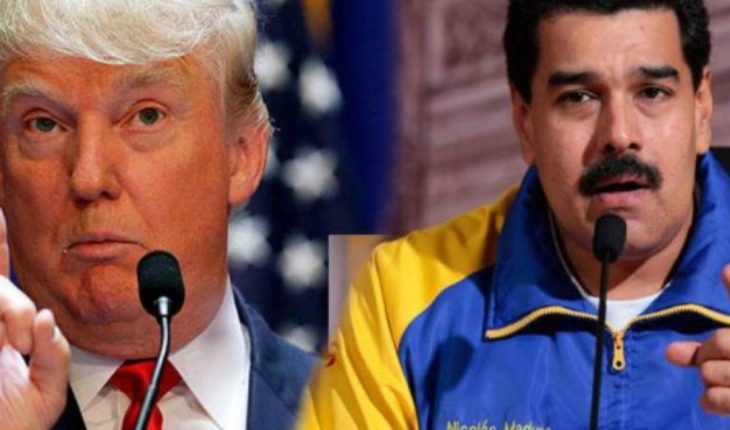when I served as a commander of the command South of United States, my first four star assignment, I visited every country and territory of Latin America except Venezuela. At the end of the first decade of the 21st century, Venezuelan President Hugo Chávez destroyed relations with USA, broken the country’s economy and polarized the electorate.
Deaths from violence have soared, reaching levels 50 times higher than Western Europe and 10 times higher than the United States. The abundance of oil in the nation became a curse, since corruption decreased the production of fields that contain the largest reserves in the world. And drug trafficking became endemic. It was an unfortunate situation for a country that he inherited the legacy of Simón Bolívar, the great liberator.
When Chavez died of cancer the 2013, there was a brief moment of hope that his death would pass to a set of more rational policies under his successor, Nicolás Maduro. Instead, the downward spiral accelerated, and a country that should be the most prosperous in the region – a “Dubai in the Caribbean” – is now in the midst of a massive refugee crisis.
Nearly 4 million Venezuelans, of a population of about 31 million before the crisis, they have fled the country.
Refugees in surrounding countries are overwhelmed, and Colombia and Brazil in particular are struggling to cope with the arrival of Venezuelans.
And relations with the United States have worsened, to the point that President Maduro recently accused that country be preparing an invasion and trying to orchestrate a coup to overthrow his Government. It also accuses Washington support its so-called assassination attempt with a drone attack on 4 August.
Can it do US to this political, economic crisis and, above all, humanitarian?
First, the administration of Donald Trump needs to avoid anything that smacks of U.S. unilateral military action What I learned over the years in the southern command is how deeply rooted that is in the region worry about the historic intervention of US even the Nations that today are strong partners and allies – Chile, Argentina, Brazil and Colombia – are fully aware of our long history of invasions and interference in their societies. They are hypersensitive to the US Army in particular, and any other thing that seems political or economic harassment of U.S. Therefore, in addition to miss any opportunity of supporting military coups (and probably is used frequently to the CIA), the White House should try to work multilaterally, preferably through the Organization of American States and the United Nations.
Secondly, we should increase our level in terms of generation of intelligence. The southern command is often the poor sister among the nine commands U.S. combat in terms of access to resources of the Department of Defense. Approach of satellite time, aeronautical and naval surveillance missions, human intelligence and pilferage are priorities of the Central command (for Iran and Syria) and the Pacific command (for Korea in the North and China). This is normally a reasonable precedence, but given the level of instability and refugee flows, it is time to increase the priority for the Organization of intelligence of the U.S. Southern command based in Miami. We should also enlist to Colombia, since no ally has better intelligence on land in the region, particularly in Venezuela.
A third sensible approach would be to enhance cooperation between agencies, especially to anticipate possible humanitarian crises. This means not only the Pentagon, which has all the logistical power, but also the Federal Agency for emergency management, the State Department and the United States Agency for international development. Use Guantanamo Bay (Yes, that Guantanamo Bay) as preparation for humanitarian operations area makes sense, and the Department of Defense already has formal contingency plans to do so. There are previously constituted areas hosting refugees, humanitarian supplies and much experience. Although Americans tend to think of the base as a detention centre, it also has a huge strategic value for regional logistics and disaster assistance.
Fourthly, we must encourage Brazil and Colombia to join forces politically and militarily as the basis of a multinational force of control of refugees. The civil capacity of the countries of the region is being quickly surpassed, and hosts can play a role appropriate in terms of search and rescue, control masses, medical response and delivery of basic food and shelter. We should expect that other Nations in the region (both in the North of South America and the Caribbean) should be added. At that point, when it is a legitimate regional response, it would make sense to US to participate.
Do so as soon simply gives mature regime a tasty talking points about “Yankee aggression”.
Finally, we need a long-term strategy that meets the boiling cauldron of anger in Venezuela, which is approaching to territory of a civil war. That means supporting other regional actors patiently to force the mature regime to the negotiating table with the opposition, which unfortunately at the moment is fractured.
Ideally, over time, the Venezuelan people could go to the polls legitimately and choose the kind of leadership they need and deserve: one that respects human rights, allow democratic elections which can corroborate and lack of corruption, and use a free market approach to exploit the vast resources of the nation. We are very far from that, but a systematic and patient U.S. strategy in the region can take us there.
This column does not necessarily reflect the opinion of the editorial board of Bloomberg LP or its owners.
poured in this op-ed content is the sole responsibility of the author and do not necessarily reflect the editorial line nor the counter position.





